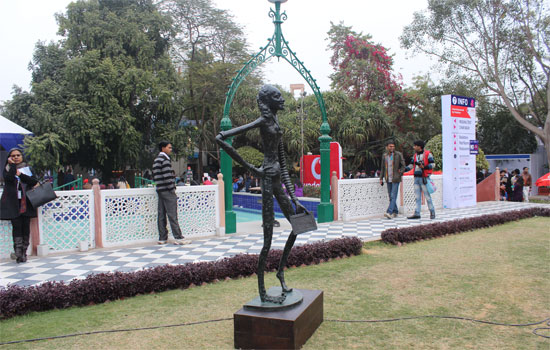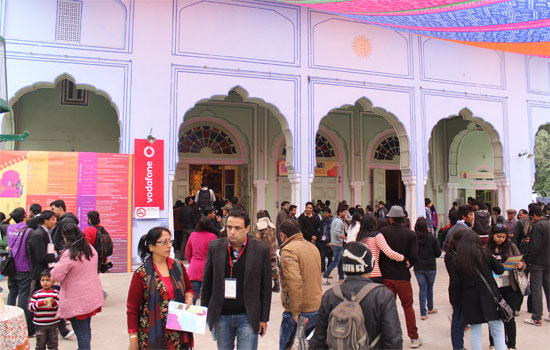There was a large commotion at the festival grounds from the early morning hours, as the organizers moved energetically between the hundreds of attendees who flocked to the Zee Jaipur Literature Festival (JLF) in Jaipur, the largest city in the northern Indian state of Rajasthan. Soon the crowd filled all the six indoor and outdoor venues, platforms for debates and workshops. The rather cold weather did not discourage the multinational audience, people from different walks of life and generations, to indulge into inspiring discussions and explore the bookstands while sipping India's unique milk-based tea, chai.
In its seventh year, Jaipur's festival has become a dynamic meeting point for literary minds and artists, showcasing stars both Indian and international. This year's festival, beginning on 17 January and running for five consecutive days at the historical Diggi Royal Palace's grounds, will witness a dynamic exchange of thoughts and experiences between 240 novelists, poets, playwrights, novelists, translators, editors and journalists, along with many economists, historians, film producers, theatre makers and musicians. As such, the festival provides a total of 170 panel discussions, with visual art exhibitions and musical events to close out each day.
"This is the world's largest free literary festival," said Rajasthan's Governor Margaret Alva, introducing the event at the opening ceremony on Friday.
"This festival has evolved into the unique forums providing the starring personalities of our time who engage with writers and readers in a collective quest for the exploration of new ideas," Alva elaborated, suggesting the pride of the country Amartya Sen, 1998 Nobel Prize winner in Economics, as well as American Nobel Prize-winning scientist Harold Varmus, along with many other top literary prize winners.
Speaking with Ahram Online, Namita Gokhale, one of the festival's two directors, discussed the event's significant evolution over the past seven years. "The audience of the festival has grown. Authors as well as the attendees of the panels come from different language and interest areas; you'll find students and older generations, people representing diverse backgrounds and experiences."
Gokhale continued by pointing to the audiences' desire to develop intellectually. "We are living in very challenging times. Everybody is trying to hang to some sort of understanding," she said, stressing the festival's aim of using literature to synthesise social and cultural multiplicity.
Mani Suri, head of design, print and branding for the festival, and also wife of H.E. Navdeep Suri, the Indian ambassador to Egypt, points to the many themes that the festival will cover this year: Endangered Languages, Women Uninterrupted, The Real Women series, Crime and Punishment, Democracy Dialogues, in addition to a multitude of workshops and artistic events. Suri, who works with Teamwork, the festival's producers, looks at the factors that hold together such a versatile program.

Jaipur Literature Festival (Photo: Ati Metwaly)
"There are two, three, even four speakers in each panel, taking place at six venues in parallel," she told Ahram Online. "The speakers might differ in their country of origin, yet there is always one dialectic joining them and fueling the panel with interesting perspectives."
It is obvious that the Jaipur festival tries to balance many elements. Hosting such an ambitious event in a country filled with colours and contradictions can be a tough challenge. Meeting expectations of all the audiences can, naturally, become a taxing factor. Organisers of the JLF, however, address this dilemma on several levels and with equal capacity.
As a result, the festival has become a dynamic and highly-engaging platform for the many minds in attendance, creating exposure for those who are already internationally acclaimed while shedding light on the many overshadowed gems of Indian literature from different regions and communities, including Dalit literature.
Gokhale is confident that the festival has kept pace with, and complemented, global literature's progression on the internet, with more readers and information than ever before.
"There is a large body of literature accessible online now. Not long ago, no one could have imagined to be able to access – yet alone afford – all those literary works," Gohkale explains to Ahram Online. "On the other hand, you will also find that today's audiences come prepared, they do their homework. The internet should be credited for this."
The festival's organisers have tried to address the changing nature of literature, and how readers search for cross-media narratives, with Jaipur Bookmark, a series of debates tackling new literary developments, trends and formats.The series that spans between 18 and 21 January is especially tailored for the publishers who are faced by a growing challenge of the fast transformations in the literary fields and readership expectations.
Beyond the literary gains, however, JLF has remained deeply rooted in human interaction, which has no online substitute. Over the years, Jaipur has become a platform for a dialogue that uses literature as a tool to delve into an endless number of issues, hopes and dilemmas of today's world.
The opening day, 17 January, kicked off with a number of appealing debates. Amartya Sen tackled issues of "choices and freedoms" in conversation with John Makinson, chairman of Penguin Random House. The concept of freedom returned again in a debate held by famed American novelist Jonathan Franzen and Indian author Chandrahas Choudhury. The topic of Indians as slaves in the 19th and early 20th century was tackled from two opposite perspectives by the award-winning Indian journalist Gaiutra Bahadur and British economic historian Emma Rothschild. Reza Aslan and Farida Hachtroudi discussed their lives as Iranians in the United States and France, respectively, a theme characterised by integration and assimilation. These were just a few of the engaging debates of the day.
The remaining days of the festival will bring yet a larger number of discussions, workshops and interactions. Shereen El Feki, Egyptian-Welsh journalist and author of Sex and the Citadel: Intimate Life in a Changing Arab World, is among the scheduled speakers at the festival's literary sessions. With music events concluding each day of the festival, it is worth noting India's emerging young musical talents alongside Algerian nomadic cult band Tinariwen.
The festival's core organiser is Teamworks Arts, an entertainment company with a large portfolio of artistic events organised across the globe, and also the company behind the India by the Nile Festival which takes place in Egypt every year.
Check the photo gallery of Jaipur festival here

Jaipur Literature Festival, indoor hall (Photo: Ati Metwaly)
Short link: